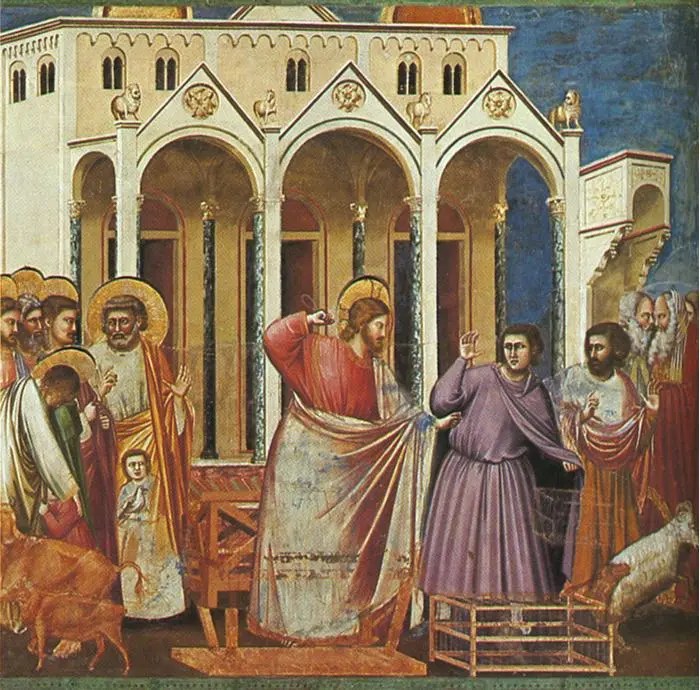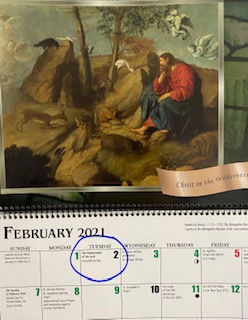Yesterday was odd: a Sunday forced to be away from church and not be present for mass. In the seven years I’ve been Catholic I’ve missed mass twice. Once because I had the worst “man-cold” in the history of the world, and once on vacation in Arkansas when we were sixty miles from the nearest Catholic church. Other than that, I’ve fulfilled my Sunday obligation no matter where I’ve happened to be. I know most of you are the same and yesterday was difficult for you, too.
My wife and I tuned into a live-streamed mass from St. Peter in Chains Cathedral in Cincinnati. That was odd, too. The only people in the entire cathedral were the Archbishop, a deacon, an altar server, a lector and a cantor. The Archbishop gave a very good homily. I assume it was the Archbishop – it sounded like his voice but the camera was so far away it was impossible to tell for sure. At the moment we would have received Holy Communion had we been there in person, we recited the Prayer of Spiritual Communion.
As much as I desired the grace that comes with receiving the Sacrament of the Holy Eucharist in a state of grace, the circumstances with the Coronavirus pandemic weren’t going to allow it. I had to believe that Christ is still with me. I had to believe that the grace I received in receiving Him in the Eucharist the previous Sunday was enough to nourish my soul until I can receive Him again. I thought, “I can do that.”
This morning’s Gospel, Jn 4:43-54, The Second Sign at Cana, helped me to better come to terms with that resolution. Today we read about the royal official, a non-Jew, who traveled a long distance to ask Jesus to cure his dying son. Jesus, knowing that He would not win many hearts in Galilee, harshly replied to the man, “Unless you people see signs and wonders, you will not believe.” The man, in humble supplication, responded, “Sir, come down before my child dies.” Seeing the man’s faith without the need for a sign, Jesus replied, “You may go; your son will live.” John then tells us, “The man believed what Jesus said to him and left”, and during his two day journey home discovered that the fever had left his son the previous day at the exact time Jesus told him his son would live.
Most of Jesus’ miracles were performed in person and usually involved Him touching the one in need of healing followed by a required action on the receiver’s part. Since the recipient wasn’t present in this miracle, Jesus did neither in extending His healing grace because He sensed the father’s faith.
The Eucharist is the source and summit of our Catholic faith. We believe and take Christ for His word when He said, “Whoever eats my flesh and drinks my blood will have eternal life” (Jn 6:54). He instructed us to “Do this in memory of Me” (Lk 22:19), which we do every Sunday, and even, if we’re so inclined, every day of the week.
The Catechism of the Catholic Church tells us that “The sacraments are perceptible signs (words and actions) accessible to our human nature. By the action of Christ and the power of the Holy Spirit they make present efficaciously the grace that they signify.” (CCC 1127). It’s like a husband giving flowers with a sincerely spoken and affectionate “I Love You” to his wife as a sign of his love.
But, the Catechism goes on to say, “Nevertheless, the fruits of the sacraments also depend on the disposition of the one who receives them.” (CCC 1128).
What does this mean? It means that when you go to mass and receive the Sacrament of the Eucharist, you may not necessarily be receiving all the graces that are possible. Even though the Eucharist is always an infinite amount of grace, just because one goes to the Fount of Living Water doesn’t mean that one always drinks from it. Total refreshment comes only through a strong faith and living a life of prayer. Going back to the analogy of the flowers, the love felt by the wife is a function of the disposition of her heart and is independent of the love expressed by the husband.
So, where does this leave me? I know I cannot receive Jesus in the Eucharist at the present time nor the sacramental grace that goes with it. But, I can, with the help of the Holy Spirit, dispose my heart to loving Jesus more through deepening my faith, a deeper prayer life, living a life of virtue, and showing God more gratitude, thus receiving an increase in sanctifying grace.
How does one do this? Developing a deeper prayer life may mean spending 20 to 30 minutes a day reading daily Scripture and reflecting on it; meditating on the Word of God and asking the Holy Spirit to show you what His will is for you that day; and, then making a resolution to take action and follow His lead and do His will.
It may mean taking time for silence and solitude where you can simply love God more, feeling His presence, and trusting that His love will carry you through the day.
We can deepen our faith by seeing God around us in the people we meet, our family and friends; in the words and help offered by a kind person; by the phone call from someone you care about. We can imitate the virtue of Christ and serve others; call upon our loved ones; seek to serve the vulnerable elderly while they are shut-in.
And, we can pay attention to and give thanks for the circumstances of our lives: take pleasure in the flowers that are starting to bloom in our gardens; the birds who are feeding at the bird feeder; and the beautiful sunrises and sunsets (if there are such things in Ohio in the grayness of March!).
I believe our God is an understanding and loving God. He knows we long to receive Him in the Blessed Sacrament. But, in His infinite Wisdom, He has permitted the current situation. Maybe He’s giving us the opportunity to grow closer to Him, to show our faith without the sign that we cherish so much.
God bless and may the Peace of Christ be with you.
“Oh my Jesus, I believe that You are present in the Most Holy Sacrament. I love You above all things, and I desire to receive You into my soul. Since I cannot at this moment receive You sacramentally, come at least spiritually into my heart. I embrace You as if You were already there and unite myself wholly to You. Never permit me to be separated from You. Amen.”
(Prayer of Spiritual Communion)
(Believing Without Signs was first published on the blog Reflections of a Lay Catholic)
©2013-2020 Reflections of a Lay Catholic. Reposting and sharing of material in its full and original content is permitted, provided that full and clear credit is given to the author(s) and Reflections of a Lay Catholic.










